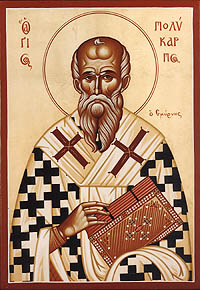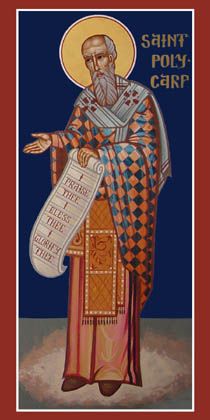|
|||
|---|---|---|---|
| This weekly bulletin insert complements the curriculum published by the Department of Christian Education of the Orthodox Church in America. This and many other Christian Education resources are available at http://dce.oca.org. | |||

The Church celebrates the memory of Saint Polycarp of Smyrna. This man was a student of the Holy Apostles, and can teach us something important about forgiveness. Polycarp was appointed Bishop of Smyrna by Saint John the Evangelist and Gospel writer, sometime before John was banished to the island of Patmos in the year 96. Over the long years of his episcopacy, Polycarp attracted and taught many disciples of his own. They remembered the majesty of his countenance, the holiness of his behavior, and the conversations in which he told them the words he had heard from the Apostle John's own lips. The one piece of writing we have from Polycarp's own hand is his letter to the Philippian Christians. In it he mentions by name several believers who have undergone torture and died for the faith. Then, despite all the suffering he has seen, he cautions the Philippians never to be vengeful, but to forgive and show mercy to everyone. Yet it was said that Polycarp had once met the heretic Marcion in the street and neglected to greet him. Marcion was offended and said, "Polycarp, what is this? Do you not know me?" Polycarp's answer was, "Yes, I know you to be the son of the devil!" His disciples also said that Polycarp would literally stop his ears and flee from the room if he heard a heretical statement. The encounter with Marcion and the description of Polycarp's "fleeing" show us that he never confused forgiveness with acceptance of heresy or sin. That is a temptation for many in our day. When people do or say things that contradict the teachings of the Church, we may let it go in the name of tolerance, and tell ourselves that we are practicing Christian forgiveness. But Polycarp would disagree. As he stood in the Roman arena awaiting martyrdom, he calmly prayed and asked forgiveness for everyone, including those eagerly gathering wood to build a fire and burn him to death. But his prayers for forgiveness did not include accepting the sin and heresy of denying Christ and worshipping a false god. When urged to do so he said, "I have served Him these 86 years, and He never did me any harm, but much good, so how can I now blaspheme my King and Savior?"
We are called to forgive and to ask God's mercy. Polycarp's example reminds us not to confuse forgiveness with blanket acceptance or toleration of anything people do or say. As we struggle to do what is right and say only what is true, we can pray for others to do the same, and guide them when we have the chance. If we make that effort, we will be able to stand in our own "arena"—whatever trials and tests come—and say that we, too, will not blaspheme the One who "never did me any harm, but much good." |
|||

